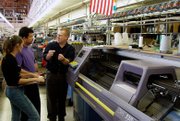Santa Monica College Turns to High-Tech Training for Apparel Workers
Santa Monica College (SMC) is doing its part to bring Southern California apparel industry workers up to speed in the technology department. The college next week will launch an 18-month program to train up to 86 industry workers in the use of high-tech garment manufacturing.
The program will kick off at the West Los Angeles factory of French Rags, which makes high-end knit goods and is known to outfit former first lady Hillary Clinton, among others. Other companies that are expected to participate in the program include knitwear makers Woo-Ami and Lafa Co.
SMC is financing the program with a $200,000 grant from the state-run California Employment Training Panel. The investment comes during a time when the local apparel industry continues to be challenged by imports and low-cost offshore labor. With more than 26,000 jobs lost over the past five years, industry leaders have been promoting the use of technology in local manufacturing as a way to gain an edge. The California Fashion Association, for one, has been active by co-sponsoring such events as last summer’s fashion technology expo at the California Mart and is exploring similar events for the future, said director Ilse Metchek.
After seeing success with occupational programs linked to the local hotel, airline and restaurant industries, SMC’s associate vice president, Marvin Martinez, said the college wanted to help the local apparel industry after gaining more insight through French Rags founder Brenda French.
“It’s the largest manufacturing sector in Los Angeles but it’s facing keen overseas competition and is turning more and more to sophisticated machines that are faster, more accurate and ultimately lower-cost than using unskilled laborers,” he said.
The initial participants at French Rags will be trained to manufacture knitwear on computerized flat knitting machines made by Stoll GmbH & Co. of Germany. These machines, at $70,000 to $150,000 each, are state-of-the-art and can produce complete garments in 35 minutes, compared to 2 1/2 hours on a hand-looming machine, according to instructor Reiner Rockel. They are also capable of industrial applications and can weave with copper wire and other materials and make 3-D products if needed.
“You can knit a shoe box if you want to,” said Rockel.
Because there’s a low margin for error on these machines and French Rags deals in high-end garments from $200 on up, Rockel said there will be a steady learning curve with instruction beginning on more simple hand machines at first.
“French Rags has a generation of machines, so it’s like a museum in which the students can see how the machines have evolved,” he said.
The manufacturer also has a regional office in Monterey Park where students can see the latest technical advancements in knitting machines.
“This program doesn’t just benefit us, but the entire industry,” said Mile Rasic, principal of French Rags. “This gives workers greater know-how so they can upgrade their skills and become more [marketable].”
The program will be conducted in three stages covering operation, maintenance, and programming and design. Martinez said the college will offer language instruction from the ESL (English as a Second Language) department for those participants who need it.
Rockel added that the program will also give designers an opportunity to learn more about the production process to enrich their current skills.






















